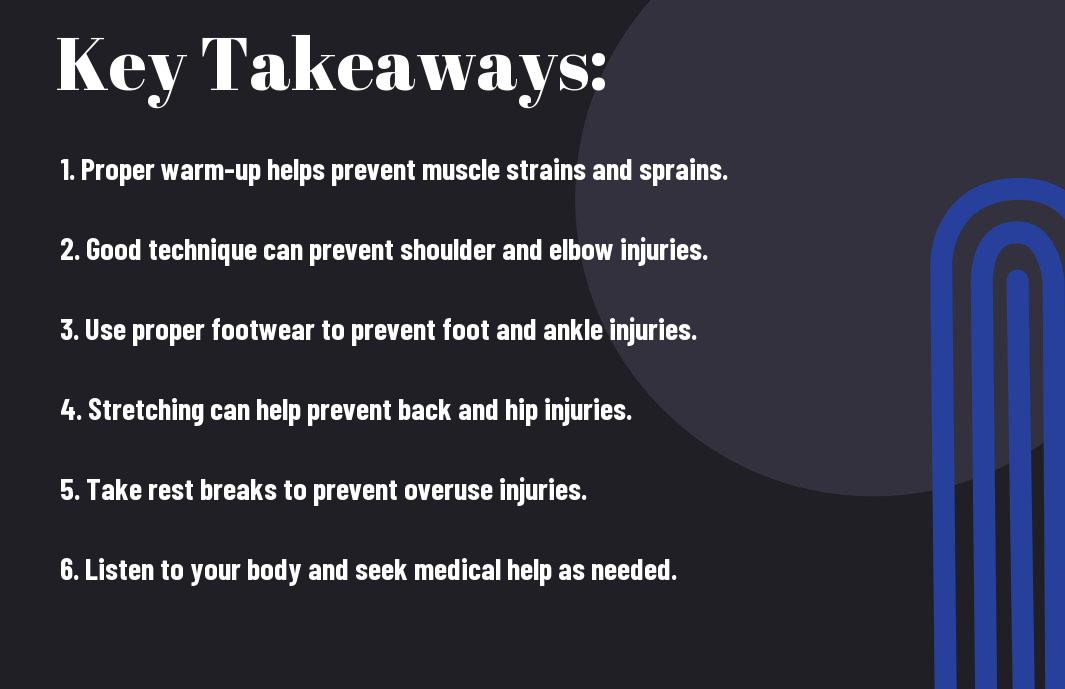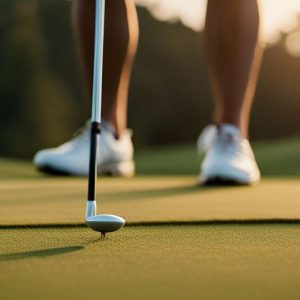Avid golfers and enthusiasts alike are no stranger to the physical demands of the sport. However, it’s important to acknowledge that golf can also lead to a myriad of injuries that can hinder performance and enjoyment of the game. From back pain to golfer’s elbow, there are several common golf injuries that players often encounter. In this blog post, we will discuss the most prevalent golf injuries and provide valuable insights on how to prevent them. By understanding the causes and implementing preventive measures, golfers can ensure that they can continue playing the sport they love without the fear of injury.
Key Takeaways:
- Common Golf Injuries: Some of the most common golf injuries include back pain, golfer’s elbow, and shoulder injuries. These are often caused by poor swing mechanics, overuse, and lack of conditioning.
- Preventative Measures: To prevent these injuries, golfers should focus on improving their overall fitness, maintaining proper swing mechanics, and using proper equipment. Regular conditioning exercises and stretching can also help reduce the risk of injury.
- Seek Professional Guidance: It is important for golfers to seek professional guidance from a golf instructor or physical therapist to address any biomechanical issues and to develop a tailored exercise program to reduce the risk of injury.

Common Golf Injuries
Obviously, golf is a great way to get some exercise and enjoy the outdoors, but it can also lead to a variety of injuries if proper precautions are not taken. Some of the most common golf injuries include lower back pain, golfer’s elbow, and wrist strains. Understanding these injuries and how to prevent them is essential for any golfer looking to stay healthy on the course.
Lower Back Pain
To many golfers, lower back pain can be a nagging and persistent issue. The repetitive motion of the golf swing, especially when done incorrectly, can contribute to strain and discomfort in the lower back. Proper warm-up exercises and stretching, along with focusing on strengthening the core muscles, can help prevent lower back pain in golfers. Additionally, maintaining a good posture throughout the swing and ensuring proper technique can also mitigate the risk of lower back injuries.
Golfer’s Elbow
One of the most common overuse injuries in golf is golfer’s elbow, which affects the tendons on the inside of the elbow. This injury can be caused by the repetitive motion of the golf swing, especially if the grip is too tight or if the swing technique is flawed. Golfers can prevent golfer’s elbow by using proper swing mechanics, focusing on flexibility and strength training, and using equipment that fits their body and swing style. It is important for golfers to listen to their bodies and seek medical attention if they experience any pain or discomfort in their elbows.
Elbow injuries, such as golfer’s elbow, can be debilitating for golfers and can significantly impact their ability to play the game they love. That’s why it’s crucial for golfers to be aware of the potential risks and take proactive measures to prevent such injuries by practicing proper technique and using appropriate equipment.
Risk Factors and Causes
Unlike other sports, golf injuries are often caused by a combination of factors, including poor swing mechanics, overuse, and repetitive motions. Other risk factors for golf injuries can include age, level of physical fitness, and any existing medical conditions. Furthermore, the equipment used, such as clubs and shoes, can also contribute to the development of injuries.
- Poor swing mechanics
- Overuse and repetitive motions
- Age and physical fitness level
- Existing medical conditions
- Equipment, such as clubs and shoes
After identifying these risk factors, it is crucial for golfers to understand how to prevent injuries and optimize their performance on the course.
Swing Mechanics
Mechanics play a pivotal role in the development of golf injuries. Poor swing mechanics can place excessive stress on the body, leading to injuries in the shoulders, back, and elbows. Incorrect posture, improper grip, and an overaggressive swing are common culprits for these types of injuries. It is essential for golfers to seek professional guidance to ensure proper swing mechanics and reduce the risk of injury.
Overuse and Repetition
Risk of injury in golf is significantly elevated due to overuse and repetition of the golf swing. The repetitive nature of the swing can lead to strain and stress on the muscles and joints, particularly in the shoulders, wrists, and knees. Without proper conditioning and rest, golfers are susceptible to overuse injuries that can hinder their performance and lead to long-term damage.
For instance, inadequate warm-up and cool-down routines, combined with frequent play and practice sessions, can contribute to the development of overuse injuries. It is crucial for golfers to incorporate proper stretching and strength training exercises into their routine to mitigate the risk of these injuries.
Prevention Strategies
Now that we understand the common golf injuries, it’s important to discuss how to prevent them. By implementing the following prevention strategies, golfers can reduce their risk of injury and ensure a more enjoyable and pain-free experience on the course.
Proper Technique and Form
For golfers, proper technique and form are crucial in preventing injuries. This includes maintaining a neutral spine, evenly distributing weight, and using the correct body mechanics during the swing. Engaging in regular lessons with a golf professional can help ensure that your form and technique are correct, reducing the risk of overuse injuries and strains.
Strength and Flexibility Training
Flexibility and strength are key components in preventing golf injuries. Flexibility exercises, such as yoga or stretching routines, can help improve range of motion and reduce the risk of strains and sprains. Strength training focused on the core, legs, and shoulders can help stabilize the body during the golf swing, preventing excessive strain on the joints and muscles.
A combination of exercises such as yoga, Pilates, and weight training can help improve flexibility, core strength, and overall muscle balance, reducing the chance of common golf injuries such as rotator cuff strains, lower back pain, and golfer’s elbow.
Conclusion
With these considerations in mind, it is clear that golf injuries are a common occurrence and can significantly impact a player’s performance. However, by incorporating proper warm-up techniques, maintaining good swing mechanics, using appropriate equipment, and participating in strength and flexibility training, golfers can effectively prevent these injuries. Being mindful of one’s body and taking proactive measures to avoid injury will not only enhance a player’s overall game but also ensure their long-term enjoyment of the sport.
FAQ
Q: What are the most common golf injuries?
A: The most common golf injuries include golfer’s elbow, tendinitis, back pain, and shoulder injuries. Golfer’s elbow is caused by overuse of the muscles in the arm and forearm, while tendinitis is inflammation of the tendons due to repetitive motions. Back pain can result from the high-impact nature of the golf swing, and shoulder injuries can occur from improper swing mechanics.
Q: How can golf injuries be prevented?
A: To prevent golf injuries, it is important to warm up before a round of golf to prepare the muscles for activity. Stretching can help improve flexibility and reduce the risk of strains and sprains. Using proper swing mechanics and technique is crucial in preventing injuries, as incorrect form can put unnecessary strain on the body. Additionally, wearing supportive footwear and using equipment that fits properly can help reduce the risk of injury.
Q: What should I do if I experience a golf injury?
A: If you experience a golf injury, it is important to rest and avoid further aggravating the affected area. Applying ice to the injury can help reduce inflammation and alleviate pain. If the injury does not improve or worsens, it is advisable to seek medical attention from a healthcare professional who specializes in sports injuries. They can provide a proper diagnosis and develop a treatment plan to aid in recovery.
Hey, I'm Maxwell Fairway, a name that's been echoing on golf courses for over a decade. Golf has been my driving force, propelling me through the world of fairways and greens since my early days. With each swing, I've crafted my skills, refined my approach, and gained invaluable wisdom about this captivating sport.






